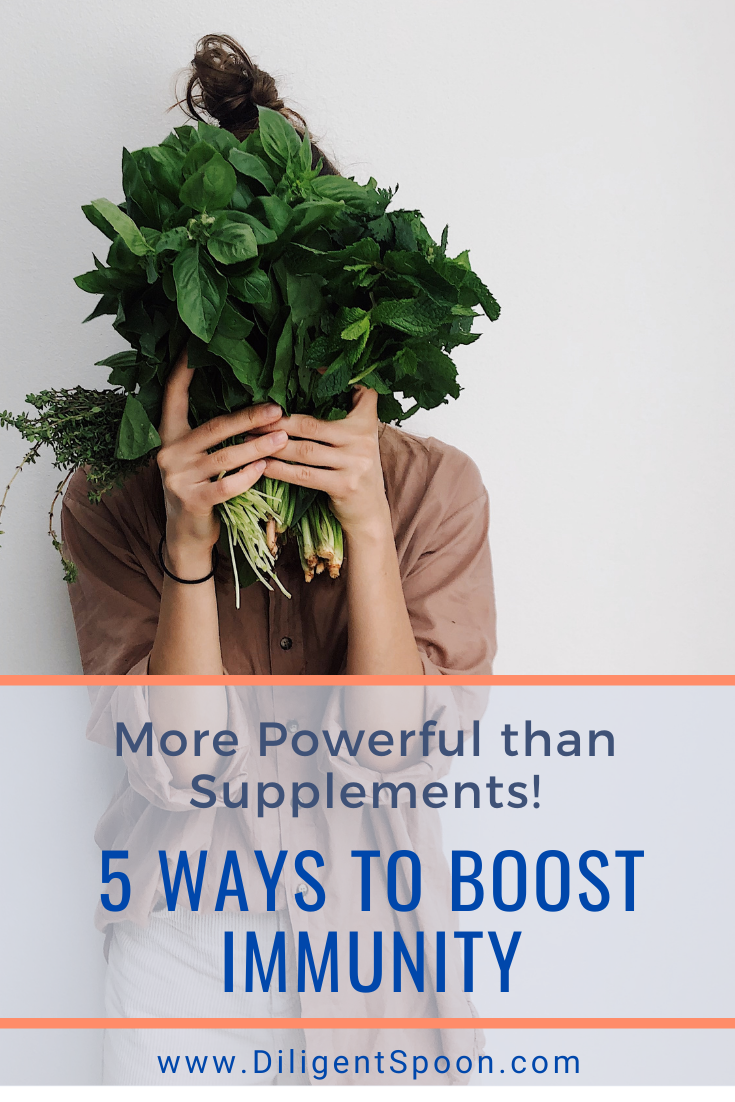
More Powerful Than Supplements – 5 Ways To Boost Your Immune System
There’s a lot of talk around how to boost your immune system every fall, and it’s reached a fever pitch this year. Retailers offer a ton of different supplements, tinctures, and devices that claim to jumpstart your immune system. While a quick-fix sounds great, kickstarting your immunity is not that easy.
Our complex immune system is truly remarkable! It fights off illnesses and can distinguish between “good” and “bad” bacteria. At the same time, the immune system is smart enough to tell what is self, not self but not dangerous, and not self and dangerous. In order to be strong enough to fight off invaders – and smart enough to identify them – the immune system is complex, controlled by many inputs and factors.
How To Boost Immunity?
Our immune system is complicated, and improving our own immune response is not as easy as popping a pill, as nice as that would be! Still, there are simple lifestyle habits that we can practice to help our immune system fight off illness and infection. These five strategies – that you can start today and cost nothing – will provide more benefit than a medicine cabinet’s worth of supplements.
1. Eat for Health
It makes sense that eating well – providing the right fuel for your body – would give your immune system all that it needs to work at its best. First and foremost, we need enough energy (calories) to fuel our entire body, including the immune system.
Aside from eating enough, a healthy diet should include plenty of vegetables, fruits, proteins, and healthy fats. Some specific vitamins that are important for immune function are listed below, along with great dietary sources of each:
- Beta-carotene (Vitamin A) – beef liver, orange vegetables (sweet potato, carrots, pumpkin), spinach, eggs
- Vitamin B6 – beef liver, chicken, salmon, tuna, bananas, potatoes with skin
- Vitamin C – sweet peppers, citrus fruits, strawberries, tomatoes, broccoli, spinach
- Alpha-tocopherol (Vitamin E) – almonds, sunflower seeds, hazelnuts, peanuts and peanut butter, spinach
- Zinc – red meat, shellfish, pork chops, chicken (especially dark meat), seeds like hemp and pumpkin, some dark chocolate
**This is not an all-inclusive list! Please see this article and other resources at the bottom of the post if you want to research further.
What to do?
Maybe you noticed that a few foods are great sources of several nutrients. So, a great way to boost immune system is to add lots of colorful vegetables and fruits. In addition, eating some red meat, seafood, seeds and nuts to your diet can go a long way to bolstering your immune system.

You may be thinking, “Can’t I just take a multivitamin?” Yes, you can. However, your body absorbs and uses food-based vitamins and minerals a lot better than pill-form varieties.
Not sure how much you should be eating? Here’s a great calculator.
Need some ideas?
- Check out this roasted broccoli post. This recipe can be used for pretty much any vegetable – sweet potatoes, peppers, carrots, squash …
- Create amazing salads that include immune-boosting foods. Then, make the salad a meal by adding tuna or chicken.
2. Get Some Exercise
Exercise boosts immune function in two key ways:
First (and this is cool), moving your body improves your circulation, which helps physically transport immune cells to the far-reaching areas of your body.
Second, physical activity has been shown to reduce stress hormone cortisol (more on that under “Reduce Stress” below). High cortisol levels can lead to a weak immune system. Exercise does actually reduce stress!
What to do?

First, if you have any health concerns, check with your doctor before starting an exercise program.
Then, get moving in whatever way you find enjoyable. Studies have shown that just thirty minutes of activity, three times per week will improve overall health. If you’re looking for some ideas:
- Yoga is a great way to add gentle movement, increase strength and mobility. You can start a yoga practice for little to no cost.
- If you enjoy or want to start playing a particular sport, seek out opportunities to play by joining a local club or parks & rec team.
- There are so many home workouts available online. You can find them by searching key phrases like “home workout no equipment”. Here’s one of my favorite arm workouts.
3. Prioritize Sleep
Sleep – that is, getting enough of it – has been known to improve immune function for decades, maybe centuries.
Specifically, research has shown that sleep is crucial to forming “long-lasting immunological memories”. What does this mean? It means that when your body meets a nasty virus, the body produces more of the antibodies to fight that virus if you get enough sleep. On the flip side, sleep deprivation has been shown to cause decreased immune response to illness and infection.
Chronic sleep loss is now seen as a state of sustained stress (more on stress below). We are well aware that losing sleep makes us grumpy, and unable to focus. However, research now shows that sleep loss leads to more illnesses and infections.
What to do?
First, if you’re not sure how much sleep you need, get an estimate by using a tool like this.
Next, try to go to bed and wake up similar times each day (9:30pm and 5am here). Research has shown that one of the most important keys to great sleep. Easier said than done, I know.
Also, if you find yourself waking in the night, seek out ways to improve your sleep:
- For example, I create my own quiet room by wearing earplugs to bed.
- Many people find white noise machines or fans helpful.
- Avoid caffeine late in the day and eating big meals just before bed.
Since sleep is so important for overall health, consider talking to your doctor if you’re not able to sleep.
4. Drink Water
Our bodies are full of water (70% or so), so it should be a no-brainer that we should drink plenty of it. Even if you’re not running marathons or sweatin’ to the oldies, you are still constantly losing water through your breathing, urine, and skin.
All the fluids in your body are mostly water. Specifically, lymph is a fluid in your circulatory system that carries immune cells around your body. Dehydration slows down the movement of your circulatory system, which can lead to a weakened immune system.
What to do?
Most of us are familiar with the recommendation to drink 8 cups (that’s 8 oz per cup) of water per day. Using that as a starting point, most of us would benefit from drinking more. That’s because we exercise, perhaps it’s winter and the air is drier, etc. I know, 8 cups sounds like waterlogging yourself, so here are some tips to make it “easier to swallow”:
- Get into the habit of drinking a 16 oz glass of water first thing in the morning. When you wake, your body is already a little dehydrated, so this is a great way to start your day hydrated.
- Infuse flavor – Try adding lemon, cucumber, watermelon, or other fruits to your glass to make drinking water more interesting.
- Bubbles – For me, sparkling water is just a lot more fun than still water, and, I drink it a lot faster!

5. Reduce Stress
We usually feel some physical reactions when we’re stressed – upset stomach, headache, irritability. Our body’s natural “fight or flight” response causes these symptoms. Although running late to your kid’s recital won’t hurt you the way an angry bear could, our body’s stress responses are similar in both situations.
Our bodies release hormones (adrenaline, noradrenaline, cortisol) to help us fight off or run away from the danger. These stress hormones help us face danger by pumping more blood to muscles, among other things. At the same time, stress hormones decrease or shut down systems like digestion and immune function. So, prolonged stress leads to lower immune system response.
What to do?
As individuals, we humans have many ideas of what stress relief looks like. For me, exercise (especially running) is a great stress reliever. Here are a few other suggestions, most of which you’ve probably heard of. Reminders never hurt, though, right?
- Meditation and/or prayer
- Exercise, especially with an encouraging friend
- Reading and writing

Lifestyle Over Supplements
If you’re looking for ways to build a fighting strong immune system, simple (but not always easy) lifestyle habits can make all the difference. Additionally, be skeptical of supplements that promise to improve your immune system. The truth is, there is no evidence that supplements help you fight off illness and infection, and supplements (and their claims) are not regulated by the FDA.
In order to help your body stay healthy, consider these habits that will give our bodies what they need to thrive.
I’m curious, what do you do to fight off illness during the winter/flu season?
Stay well!
RESOURCES
Should you get your nutrients from food or from supplements?
DRI Calculator for Healthcare Professionals
A Review of Micronutrients and the Immune System–Working in Harmony to Reduce the Risk of Infection
5 Ways to Boost Your Immune System




